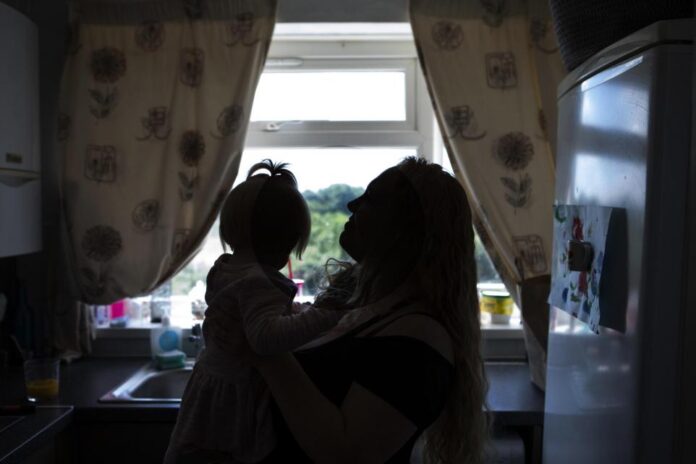The damage from the pandemic caused to children’s development has been exacerbated by rising levels of child poverty.
Here, three experts from Manchester Metropolitan University consider the impact.
Poverty affects all aspects of childhood
By Karen Hughes, Senior Lecturer in Specialist Community Public Health Nursing
Many families are struggling to provide the basics to meet the daily needs for their children – buying food, heating homes, providing suitable clothing and safe places to sleep, generating much stress for the whole family.
The impact of these stresses is wide reaching. When facing these daily challenges, parents experience stress, fear and have less ability to manage their own emotions. Conflicts arise, relationships break down, leading to family fracture and children potentially losing their homes. Experiencing high levels of chronic stress and fear causes anxiety for children which negatively shapes their neurological development and limits parents’ capacity to help their children learn how to regulate their emotions.
Dysregulated emotions lead to children being less able to make and maintain appropriate friendships, which are vital for cognitive, emotional and speech and language development. Children can become disruptive in early years and school settings, further hindering all aspects of their development and education and increasing the risk of children internalising a sense of low self-worth and self-efficacy, which impedes the ability to thrive socially and educationally.
When funds are so restricted and basic needs aren’t being met, being able to resource age-appropriate toys can be impossible, limiting children’s opportunities for play, which is vital for learning. When play is restricted in the early years, children’s readiness for learning in school is harmed, they are less likely to have learnt how to problem solve, they may have immature fine motor skills, their capacity to concentrate is reduced, and turn taking skills won’t have been practised.
Exposure to a wide range of language is vital, through talking and reading, to enable children to learn the art of communication and develop an understanding of a wide range of language. Without this, the word gap continues to negatively impact child development, reduce children’s educational opportunities, and have a lifelong negative impact on employment opportunities. Without the resources to buy books, the capacity to interact with their children, positively respond to their attempts at communicating and share stories with them, parents in poverty are disadvantaged from the outset.
Many children experience constant hunger and are nutritionally deficient. Not only does this restrict their physical growth but causes emotional stress and impedes cognitive development. For children to have the opportunity to thrive and develop, they must have access to sufficient appropriate food.
A childhood experiencing hunger, cold and stress shapes the neurological and emotional development in the short and long term. Starting life in poverty widens the achievement gap and perpetuates the intergenerational cycle of disadvantage.
Investment is needed for services to support children and their families, to mitigate the risk factors associated with poverty, to enable children to develop their full potential, be ready to learn and not become disadvantaged adults.
Educators must be more understanding
By Professor Gabrielle Ivinson, Professor of Education and Community
When thinking about poverty communities and young people the narratives need to be turned upside down. We need to pay attention to the lived experiences of families who do not have enough money to cover the basics. A small upset in a typical family’s dally routine, such as the oven stopping working, can be managed with a little extra money and time. When there is no extra money, an unexpected event can throw the family into crisis.
Families in poverty live different temporal rhythms to typical families. A child may have to stay off school to let someone into the house while mum keeps her three jobs going or may go to school hungry. Young people expend energy and effort hiding the effects of poverty from peers and teachers, they pretend to not want to go on school outings, they refuse snacks offered by peers because they cannot reciprocate, they don’t bring friends home, they don’t go to town for fearing bullying.
Being poor is socially taboo, the emotional burden is not spoken about yet can build progressively.
When a young person arrives a few minutes late to a lesson, or without a pen and is immediately placed in detention, according to a zero-tolerance behaviour policy, the crushing burden of responsibility morphs into frustration, incomprehension and self-blame. It is the small incremental effects of poverty that form experiences, which became patterns.
Combinations of what for other families are trivial setbacks combined with hostile school cultures build into emotional crisis, mental ill-health and hopelessness. When the ground below your feet is precarious this kind of escalation happens easily and relatively quickly.
At the same time, a kind word from a tolerant teacher and a little bit of leeway in the school system can literally reverse this free-fall.
Changing this is not rocket science; it requires schools and other institutions to value the human above the obsession with data be they examination results, attendance targets or counting minor rule infringements.
Since austerity started, we have been heading in the wrong direction – and it is getting worse. These young people are not ‘vulnerable’ they are strong, resourceful and deeply caring – but the system does not see this.
Let’s change the narrative and value the experiences of people living complex lives.
Factors that harm language development
By Dr Ayesha Kamal Butt, Senior Lecturer in Speech and Language Therapy
The initial years of a child’s life are shaped by the richness of their interactions, experiences and their context. These factors play a significant role in the cognitive, speech and language, and social development of children in the early years. Poverty puts children in a position of disadvantage prior to them stepping into the world, especially considering the current cost-of-living crisis that has been exacerbated by Covid-19. The pandemic worsened the conditions for individuals already living in poverty and facing numerous challenges such as unhygienic living conditions, inadequate nutrition, limited access to quality educational facilities, resources and meeting everyday needs.
The loss of jobs, the heightened uncertainty and stress led to mental health issues putting pressure on relationships. Consequently, this meant reduced quality interactions between families and particularly with children. Technology in the form of additional screen time became the norm and replaced those crucial interactions that support speech and language development.
For most families living in poverty, the pandemic meant a matter of survival such as putting food on the table, keeping their homes warm, having a roof over their heads and simply meeting demands of daily living. These stresses negatively impact children and their development.
In the context of the pandemic, social distancing, wearing masks and virtual interactions made it more difficult for children who may have existing speech, language and communication difficulties such as children with autism, or with hearing impairment who could no longer make use of all available verbal and non-verbal means of communication to enhance their understanding. Virtual education disadvantaged children with speech, language and communication needs. These seemingly minor accommodations and changes were detrimental to children with existing difficulties.
Poverty effects children at all ages, however, facing poverty at an early stage has been known to significantly impact cognition, speech and language development, executive functioning and social interactions (Picolo & Noble, 2019). Language development is a neurological process and the absence of simulating environments can impact brain development and executive functioning which, as a result, reduces learning opportunities in children (Perkins et al., 2013).
There is existing evidence to state children raised in poverty present with low scores on cognitive tests, placing them at a disadvantage early in their lives (Ayoub et al.,2019). There is a clear link between cognitive, speech and language difficulties and the impact of these on later years.
It is imperative that actions are taken to support children and their families, to alleviate the risk factors associated with poverty, facilitating children to reach their full potential, enhancing their school readiness so that they are not at a disadvantage in the later stages of their lives.







